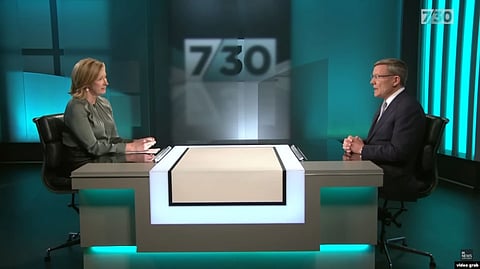The head of the Australian Secret Intelligence Service, in a rare television interview, has outlined concerns about China’s economic and military ambitions.
Information is power, and the head of the Australian Secret Intelligence Service has for the first time appeared on national television to explain how his secretive organization operates, in a bid to publicly explain its workings as it celebrates its 70th anniversary.
ASIS is one of six intelligence agencies overseen by senior members of the government in Canberra and the defense department.
It is Australia’s equivalent to Britain’s MI6 and the CIA in the United States.
ASIS director, Paul Symon, told the Australian Broadcasting Corp. that a “heightened geostrategic environment” was its “number one security challenge.”
He noted that terrorism remained a threat, especially in the Middle East and Afghanistan, which continued to be “a very dynamic and difficult environment.”
He said he is concerned about unrest in Sri Lanka and potential dangers for people if they fall in the hands of human traffickers as they try to make their way into Australia.
Symon said his agency was working hard to keep the government in Canberra informed of China’s strategic ambitions in the Pacific.
“China has, with its growing power, we think a range of economic, military, political aspirations and I think it’s impossible right now to say exactly what that end state is, or end point is for them," said Symon. "I think it’s our job in the Secret Intelligence Service to obtain, through agent access, through people who are willing to share the secrets of countries around the region, what they are thinking and what they are doing and then share that with our government, but also help the region understand what is going on as well.”
Beijing recently signed a security pact with Solomon Islands, a strategically located Pacific archipelago north-east of Australia. China failed to persuade other Pacific Island nations to join a broad regional accord, but it has struck individual agreements with Kiribati and Samoa.
In response, Australia’s recently elected center-left government has intensified its diplomacy in the region, promising stronger action on climate change. Beijing said it was not in competition with other countries for influence in the Pacific. It has, in the past, accused Australia of “anti-China hysteria” as bilateral relations deteriorated over various political and trade disputes.
Analysts have said Canberra’s attempts to reset relations with Beijing will require delicate diplomacy. China is Australia’s biggest trading partner, but a longstanding military alliance with the United States is the bedrock of Australia’s national security.
Canberra’s various spy agencies include the Australian Security Intelligence Organization and the Office of National Assessments. Three of the six intelligence agencies are operated within the Department of Defense.
Their job includes providing the information to help the Australian government navigate various geopolitical challenges.
(AS/VOA)


